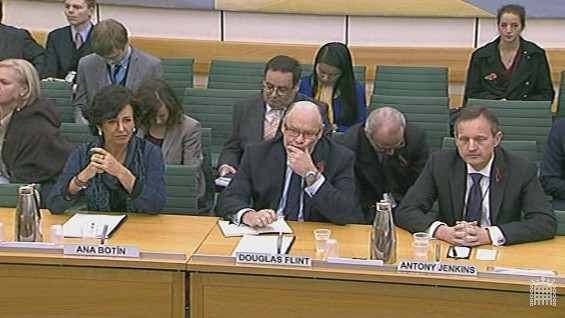Mis-Selling Derivatives: Top Bankers at HSBC, Barclays and Santander UK Defend Interest Rate Swaps

Three of Britain's top bankers defended the sale of interest rate swaps to small business customers during a parliamentary hearing despite a ban from selling these complicated derivatives to retail customers.
New Barclays' CEO Antony Jenkins and his opposite number at Santander UK, Ana Botin were joined by HSBC Chairman Douglas Flint in a Parliamentary Commission on Banking Standard Joint Committee hearing Monday which focused on the impact of the so-called ring-fencing of retail operations away from investment banking activities will have on their business.
The banking chiefs also faced a grilling over selling interest rate swap agreements (IRSAs) to small and medium-sized businesses (known as SMEs) after regulators banned HSBC, Barclays, Lloyds and RBS from selling these products to retail customers earlier this year.
Investigations into the sale of some 40,000 products led Britain's Financial Services Authority (FSA) to concluded there were "serious failings" in the way they were sold even as a number of other interest rate derivatives that can incur the same break costs or penalties continue to be offered to customers.
However, while having publically apologized in the past for the mis-selling failures, the bank bosses rounded together to defend both the need for businesses to hedge their interest rate risk and the banks' right to offer customers a simpler product under the new rules being proposed by lawmakers.
"Clearly there is a need for SMEs to have access to these types of products," said Jenkins. "I absolutely believe they should be simple (and) easy to understand (its) clear value for the customer. Our view is that you could manufacture this within the ring-fence, (although) we will probably not do that. We would manufacture them outside the ring-fence bank but deliver them on an agency basis," said Jenkins.
Santander UK's Botin agreed with Jenkins, highlight what she said was the simplicity of the hedging tools and noted her preference for selling them "not through a relationship manager but through a transaction approach where you buy the product outright".
Committee member John Thurso, however, wonder if, after hearing evidence from many companies, the agreements weren't quite as straight-forward as they were being portrayed and asked if new legislation was needed in order to properly differentiate between simple hedging tools and more complicated derivatives.
"I think you can define vanilla and it may go a bit beyond the straight forward foreign exchange deal or a straight forward interest rate hedge," answered Flint from HSBC. "At its most basic, a collar or a cap is relatively simple as well, but I think by legislation you can define simple products and I don't really mind where that ends up. But I think simple interest rate hedging products and simple foreign exchange hedging products are essential for businesses otherwise they are going to end up with greater costs as they will have multiple providers."
Thurso also pushed Flint on need to separate the person selling the derivative product from the person manufacturing the product.
"There is nothing wrong with the distributor also having the relationship [with the business]," Flint said. "The manufacturer for simple interest rate products (and) the pricing of the products is very transparent and it is not complicated."
"We are encouraging more businesses to do more internationally [and] we're encouraging them to do more risk management," he said separately, "They need to protect themselves against big moves in interest rates (and) they need to hedge foreign exchange from sales they make to commitments to make them buy things. It's an absolutely piece of plain vanilla business finance whether you are a £200,000 turnover company or a £200mn turnover company."
UK banks are currently, with an independent reviewer, investigating every IRSA sold to SMEs, in order to determine whether mis-selling occurred and if so, what level of compensation will be granted.
So far, RBS set an initial estimate of £50m, while Barclays has set aside £450m to cover the cost of possible compensation customers that have been mis-sold IRSAs. HSBC has put the figure at £150m while Lloyds has to date declined to provide details.
© Copyright IBTimes 2025. All rights reserved.






















